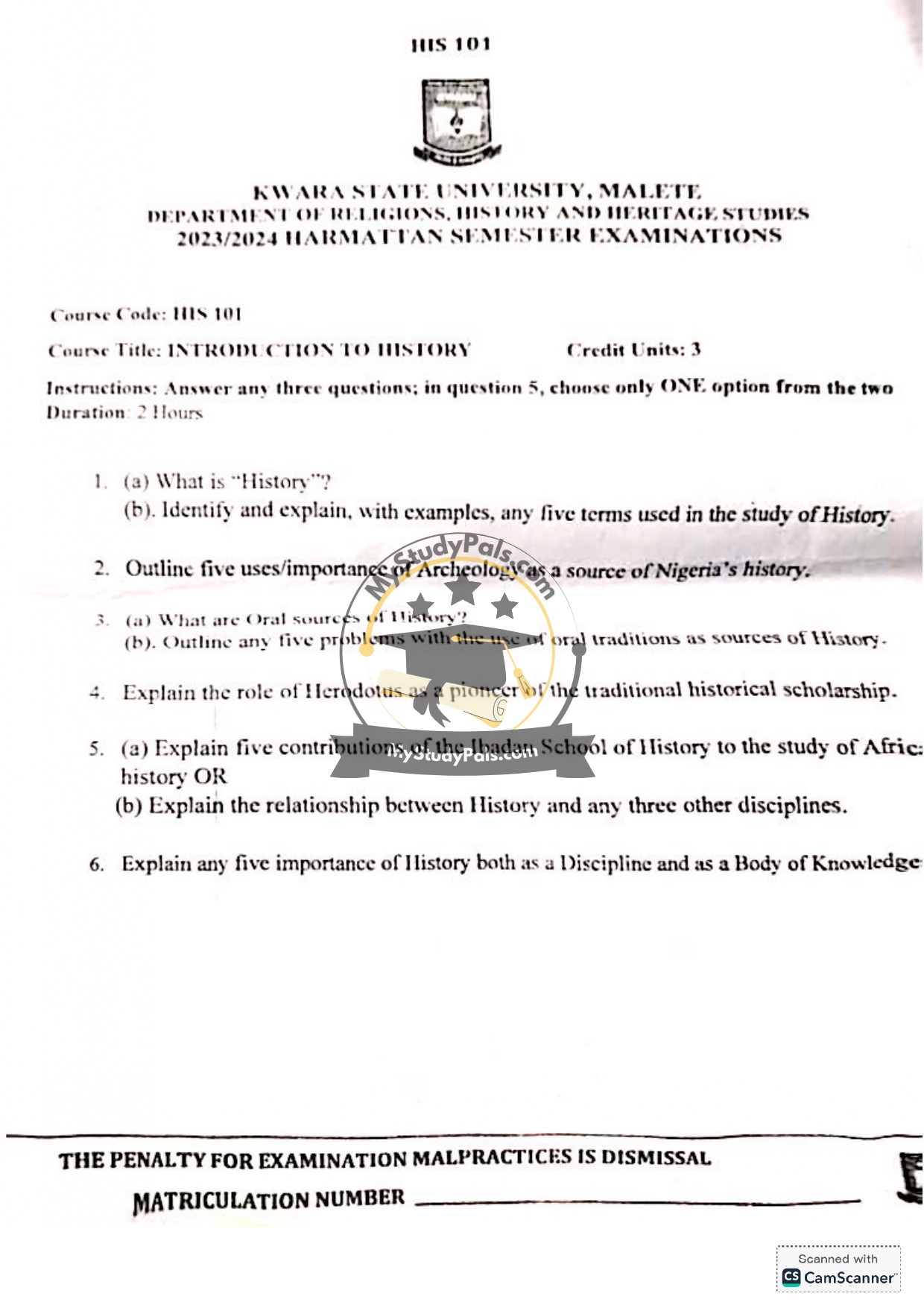ANWSER
Question 1 (a):
Answer:
History is the systematic study, analysis, and interpretation of past human events, societies, and cultures. It involves evaluating evidence from various sources to construct a coherent understanding of how societies evolved over time, emphasizing context, causation, and significance.
Question 1 (b):
Answer:
1. Primary Source: Original materials created during the period under study. Examples include the *Nok terracotta sculptures* (artifacts) or *Olaudah Equiano’s autobiography* (written account of the transatlantic slave trade).
2. Secondary Source: Works that analyze or interpret primary sources. Example: *Toyin Falola’s “The History of Nigeria”* synthesizes archaeological and oral data to explain Nigeria’s past.
3. Historiography: The study of historical writing and methodologies. Example: Debates among Nigerian historians about the impact of colonialism.
4. Oral Tradition: Knowledge transmitted verbally across generations. Example: The *Ozidi Saga* of the Ijaw people preserves pre-colonial history.
5. Chronology: The sequential arrangement of events. Example: Timeline of the Sokoto Caliphate’s rise and fall (1804–1903).
—
Question 2:
Answer:
1. Uncovers Pre-Literate Societies: Reveals cultures like the Nok, which left no written records but advanced terracotta art.
2. Validates Oral Traditions: Excavations in Ile-Ife confirm Yoruba oral accounts of early urbanization.
3. Provides Physical Evidence: Artifacts like Benin Bronzes illustrate pre-colonial metallurgical skills.
4. Dates Historical Events: Radiocarbon dating of Igbo-Ukwu artifacts places them around the 9th century CE.
5. Reveals Cultural Continuity: Findings in Daima (Borno) show transitions from Stone Age to Iron Age societies.
—
Question 3 (a):
Answer:
Oral sources are historical accounts preserved and transmitted verbally through generations. Examples include folktales, proverbs, songs (e.g., Yoruba *oríkì* praise poetry), and eyewitness testimonies (e.g., veterans’ recollections of the Nigerian Civil War).
Question 3 (b):
Answer:
1. Memory Distortion: Details may fade or change over time.
2. Bias of Narrators: Storytellers might exaggerate or omit events to favor their lineage.
3. Lack of Chronology: Dates are often vague (e.g., “during our ancestors’ time”).
4. Political Manipulation: Rulers may alter traditions to legitimize power.
5. Selective Preservation: Only culturally significant stories survive, marginalizing minority perspectives.
—
Question 4:
Answer:
Herodotus, a Greek historian (5th century BCE), pioneered critical historical inquiry in *The Histories*. He emphasized:
– Empirical Investigation: Visiting sites and interviewing witnesses.
– Differentiating Fact from Myth: Though he included legends, he noted uncertainties.
– Cultural Relativism: Documenting diverse Persian and Egyptian customs.
His methodology laid the foundation for systematic historical scholarship, despite occasional biases.
—
Question 5 (a):
Answer:
The Ibadan School revolutionized African history by:
1. Challenging Eurocentrism: Highlighting African agency (e.g., J.F. Ade Ajayi’s work on indigenous resilience during colonialism).
2. Integrating Oral Sources: Combining oral traditions with archives (e.g., Saburi Biobaku’s study of Yoruba history).
3. Focusing on Pre-Colonial Africa: Reconstructing empires like Oyo and Benin.
4. Training African Scholars: Producing pioneers like Kenneth Dike, who founded Nigeria’s National Archives.
5. Promoting Decolonized Narratives: Emphasizing African perspectives over colonial stereotypes.
OR
Question 5 (b):
Answer:
1. Political Science: History provides context for governance systems (e.g., Nigeria’s transition from military to civilian rule).
2. Sociology: Historical analysis explains social structures (e.g., caste systems in pre-colonial Hausaland).
3. Anthropology: Shared focus on culture; history tracks changes (e.g., Igbo marriage rites evolution).
—
Question 6:
Answer:
As a Discipline:
1. Develops critical thinking through source evaluation.
2. Preserves collective memory (e.g., Nigeria’s independence struggle).
As a Body of Knowledge:
3. Shapes identity (e.g., understanding ethnic histories).
4. Informs policy (e.g., learning from past economic policies).
5. Prevents repetition of errors (e.g., lessons from the Civil War).
6. Fosters empathy by exposing diverse human experiences.


